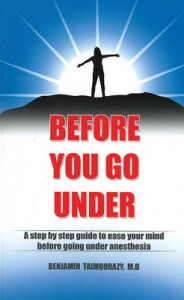Headache After Anesthesia by Subspecialized Physician
Headache After Anesthesia
By Dr. Benjamin Taimoorazy at Guardian Headache and Pain Management Institute
Headache is a relatively common postoperative problem, especially after general anesthesia. Headaches may be a sign of caffeine withdrawal in a patient who is a high caffeine consumer. But in most cases, it is an exacerbation of a per-existing headache condition such as migraines. However, there are no hazards when anesthesia is administered to patients with this disorder. Sometimes you may experience a headache after spinal or epidural anesthesia. The headache is worse if you stand or sit but is mostly relieved when you lie down.
This is called a spinal headache and is due to leakage of spinal fluid into the surrounding tissues at the insertion site of the spinal or epidural needle. Normally, the spinal fluid circulates around the brain and the spinal cord and helps maintain the brain in a floating position when we are standing or sitting up. In the absence of an adequate amount of spinal fluid, due to leakage at the needle insertion site, the brain begins sagging, hence, the spinal headache. Usually bed rest, oral pain killers and drinking plenty of liquids, especially caffeinated beverages, may solve the problem. But the definitive cure is a procedure called a BLOOD PATCH, which is immediately curative. BLOOD PATCH is basically injecting a small amount of your own blood in the same area where the spinal or epidural anesthesia was performed.
The injected blood will form a clot and patch the hole created by the spinal or epidural needle, preventing further leakage of spinal fluid and thus curing the headache. Another medical procedure which may result in headache is electroconvulsive (ECT) or shock therapy which is used in the treatment of major depression. The procedure is performed under general anesthesia and takes only a few seconds to perform.
In this situation the headache is probably due to contractions in facial and scalp muscles that occur during the therapy, and resolves spontaneously in a few hours. This the fifth in a series of articles geared to increase awareness and understanding of different types of headaches and other chronic painful conditions and the available diagnostic and therapeutic options for each individual disorder.

Please also visit doctor’s book A step by step guide to ease your mind before going under anesthesia
For more information about Headache After Anesthesia, you may contact your local sub-specialized physician Dr. Benjamin Taimoorazy at Guardian Headache and Pain Management Institute, Located in Bloomington Illinois and Newport Beach California.